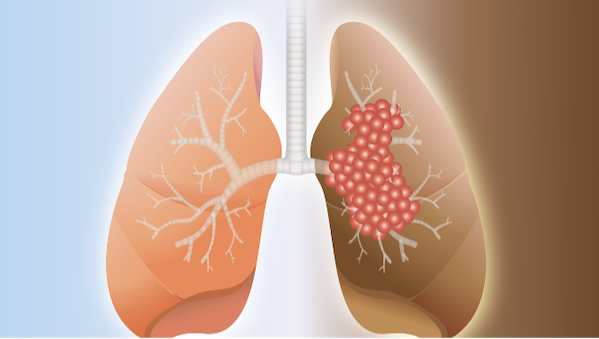Phase III Trial Data Presented at ASCO Show Imfinzi Improves Survival in Limited-Stage Small Cell Lung Cancer
June 6, 2024
Source: drugdu
 392
392
Don Tracy, Associate Editor
Results of the ADRIATIC trial indicated that treatment with Imfinzi after standard-of-care concurrent chemoradiotherapy improves overall survival and progression-free survival in patients with limited-stage small cell lung cancer. AstraZeneca announced a significant milestone from the ADRIATIC trial, which is evaluating the safety and efficacy of Imfinzi (durvalumab) for the treatment of limited-stage small cell lung cancer (LS-SCLC) in patients who haven’t progressed following concurrent chemoradiotherapycCRT. According to the company, the trial found that administration of Imfinzi after standard-of-care cCRT greatly improves overall survival (OS) and progression-free survival (PFS) compared to placebo. These results were presented at the 2024 American Society of Clinical Oncology Annual Meeting during the Plenary Session.1
AstraZeneca announced a significant milestone from the ADRIATIC trial, which is evaluating the safety and efficacy of Imfinzi (durvalumab) for the treatment of limited-stage small cell lung cancer (LS-SCLC) in patients who haven’t progressed following concurrent chemoradiotherapycCRT. According to the company, the trial found that administration of Imfinzi after standard-of-care cCRT greatly improves overall survival (OS) and progression-free survival (PFS) compared to placebo. These results were presented at the 2024 American Society of Clinical Oncology Annual Meeting during the Plenary Session.1
“The ADRIATIC results represent a breakthrough in limited-stage small cell lung cancer, a highly aggressive disease where recurrence rates are high and only 15 to 30 per cent of patients survive five years,” said David R. Spigel, chief scientific officer, Sarah Cannon Research Institute, trial investigator, in a press release. “Durvalumab is the first systemic treatment to show improved survival for these patients in decades and should become a new standard of care in this setting.”
The randomized, double-blind, placebo-controlled, multi-center global Phase III ADRIATIC trial trial evaluated Imfinzi monotherapy and Imfinzi plus Imjudo (tremelimumab) versus placebo for 730 patients with LS-SCLC who had not progressed following cCRT. Patients were randomly assigned receive a 1500 mg fixed dose of Imfinzi with or without Imjudo 75 mg every four weeks for up to four doses/cycles each, followed by Imfinzi every four weeks for up to 24 months, or to receive a placebo. The two primary endpoints of the study were PFS and OS for Imfinzi monotherapy versus placebo, with key secondary endpoints including OS and PFS for Imfinzi plus Imjudo versus placebo, as well as safety and quality of life measures.
Results found that compared to placebo, patients treated with Imfinzi experienced a 27% reduction in the risk of death with Imfinzi, with an estimated median OS of 55.9 months versus 33.4 months for placebo. Further, Imfinzi reduced the risk of disease progression or death by 24%, demonstrating a median PFS of 16.6 months compared to 9.2 months for placebo. Other results of the study indicated the following:
Patients treated with Imfinzi experienced an OS rate of 68% after 24 months, compared to 58.5% for patients treated with a placebo.
After 36 months, the OS for Imfinzi-treated patients decreased to 56.5%, with placebo-treated patients experiencing a 47.6% OS rate.
At 18 months, the PFS rate for patients treated with Imfinzi was 48.8%, while the PFS rate for patients treated with a placebo was 36.1%.
At 24 months, the PFS for patients treated with Imfinzi was 46.2%, compared to 34.2% for the placebo patients.1
GSK reported that the safety profile for Imfinzi was mostly manageable and consistent with previous findings, as no new safety signals were reported. Grade 3-4 adverse events occurred in 24.4% of patients treated with Imfinzi and 24.2% of patients administered placebo.
“The strong improvement in overall survival seen with Imfinzi after concurrent chemoradiotherapy is transformative in the treatment of limited-stage small cell lung cancer. These tremendous results underscore our ambition to drive up survival rates in this earlier-stage lung cancer setting, and we look forward to working with regulatory authorities to bring Imfinzi to these patients as quickly as possible,” said Susan Galbraith, EVP, Oncology R&D, AstraZeneca, in the press release.
Read more on
- China Sino Biopharmaceutical Signs Exclusive Licensing Agreement with Sanofi for Rofalcitinib March 4, 2026
- Gan & Lee Pharmaceuticals’ new PROTAC drug GLR2037 tablets have been approved for clinical trials to enter the field of prostate cancer treatment March 3, 2026
- AideaPharmaceuticals plans to raise no more than 1.277 billion yuan through a private placement to focus on the global clinical development of innovative HIV drugs March 3, 2026
- Giant Exits! Its Star Business Acquired March 3, 2026
- Focusing on cardiovascular and cerebrovascular diseases! OpenMediLead Medical Intelligence Dual Engines Launch Internal Testing, Connecting Drug Development and Clinical Diagnosis in a Closed Loop March 3, 2026
your submission has already been received.
OK
Subscribe
Please enter a valid Email address!
Submit
The most relevant industry news & insight will be sent to you every two weeks.



